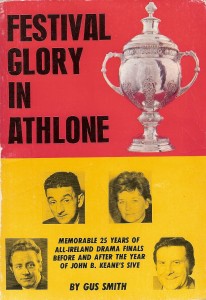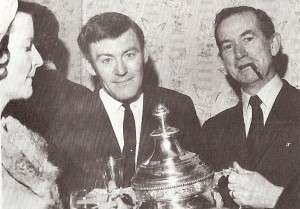Festival Glory in Athlone
 A rare book published in 1977, “Festival Glory in Athlone”, devotes a chapter to the quest of the Sligo Drama Circle to achieve the ultimate goal in the All-Ireland Drama Finals in Athlone in the 1960s and 1970s.
A rare book published in 1977, “Festival Glory in Athlone”, devotes a chapter to the quest of the Sligo Drama Circle to achieve the ultimate goal in the All-Ireland Drama Finals in Athlone in the 1960s and 1970s.
Penned by Gus Smith, a newspaper drama critic at the time, chapter 20 in the book is entitled “Sligo’s ‘Streetcar’” and gives a fascinating insight into the Drama Circle at the time, the personalities involved and their great win in 1970.
It mentions how the Drama Circle competed in the All-Ireland the previous year with Tennessee Williams’ first Broadway hit “The Glass Menagerie”, directed by Liam Mc Kinney, and quotes a review of the play from the Irish Times which called it “an exquisite presentation”, heaping great praise on Joan Fitzpatrick, Shane Cleary, Eddie Fitzpatrick and Imelda Walshe.
The article focused on the rise of Liam Mc Kinney through the ranks of the Drama Circle until he directed his first play in 1964. Referring to him as “the best amateur producer in the country”, it notes that he won the producer’s award in 1970 for “A Streetcar Named Desire” and again in 1971 for “Death of a Salesman”.
The article mentions how the Drama Circle grew out of the Unknown Players and gives a mention to some of the prominent “Unknowns” of the time: Charlie and Maggie Hughes, Jim Wynne, Mary Watson, Tom Palmer, Joe Burns among others.
Dealing with the great win of 1970 with the Tennessee Williams play “A Streetcar Named Desire”, the article gives great praise to the leading actors of the play: Deirdre O’ Connor, Joan Fitzpatrick, Shane Cleary and Cormac Sheridan as well as the producer Liam Mc Kinney. Quoting the adjudicator of the festival Robert Armstrong:
“I waited all week for the Festival to take fire and it did not happen until tonight when there was sudden combustion”.
The article mentions other great performances by the Drama Circle at the All-Irelands including “Montserrat” (1960), “My Three Angels” (1962) and “Death of a Salesman” (1971), all of which came close to winning another national title.
There is a large portion towards the end of the article devoted to the plans of the Drama Circle for a purpose-built theatre for Sligo. It mentions that the plan was already well under way and that the site for the new theatre had already been donated by the Bishop of Elphin. It emphasised the necessity of a theatre for Sligo and said that “the visionaries of Sligo see the new theatre as being to the North-West what the Abbey Theatre is to Dublin”.
Tags: All-Ireland, History










